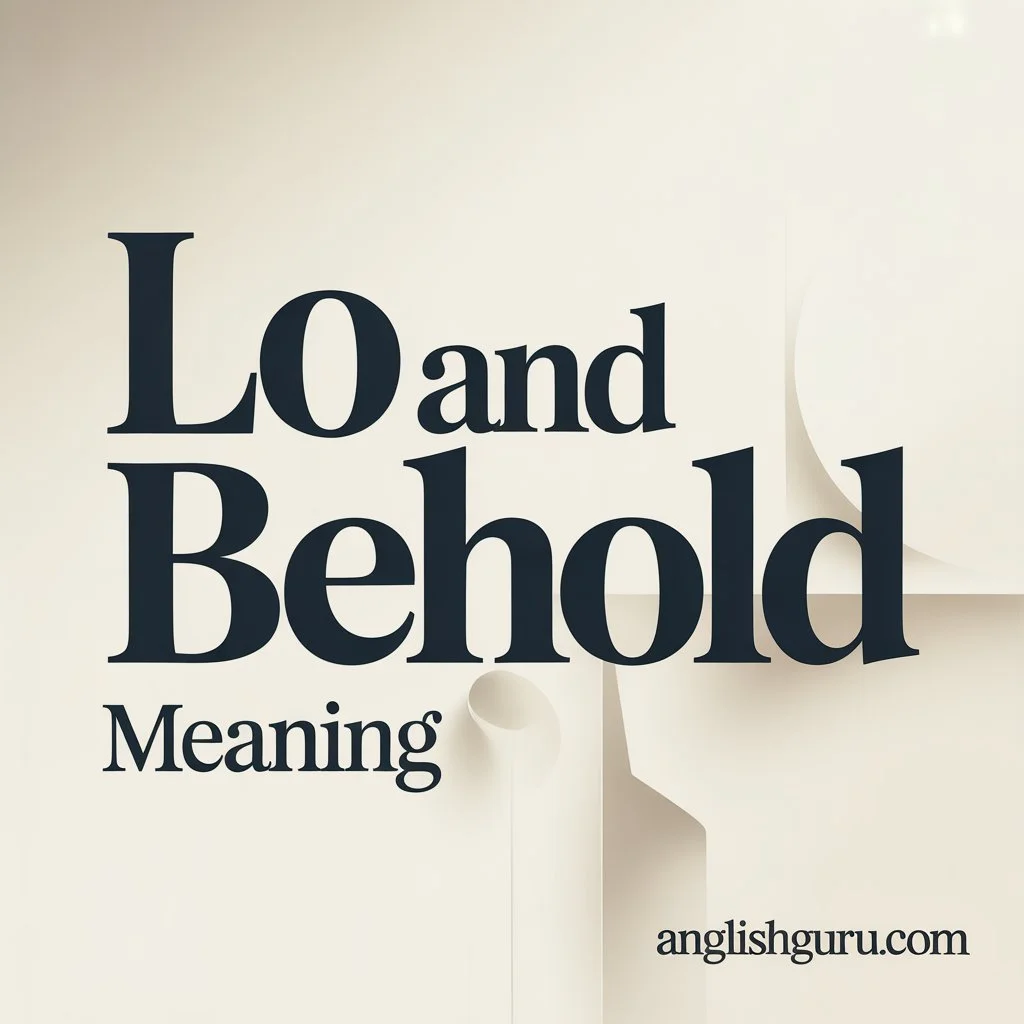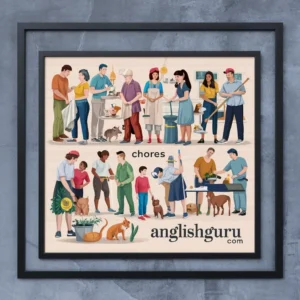Introduction
Language constantly evolves, and the phrase “Lo and behold” remains one of those timeless expressions that continue to fascinate English learners and native speakers alike. Understanding the Lo and behold meaning helps you capture surprise, wonder, and storytelling charm in both writing and conversation.
You might have heard someone say, “And lo and behold, there it was!” — but what does it truly mean? Is it still used in modern English, or does it sound old-fashioned?
In this article, we’ll explore the complete Lo and behold meaning, its origin, and how to use it effectively in formal and casual contexts. You’ll also discover 16+ creative alternatives and 11 real texting examples that show how this expression naturally fits into modern speech and writing.
Why Understanding the Lo and Behold Meaning Matters
Expressions like “Lo and behold” enrich English by adding drama, surprise, and emotion. They help speakers sound more expressive and engaging in storytelling or conversation.
Many learners wonder: Is “Lo and behold” too old-fashioned? Or even mistakenly write it as “low and behold”?
Understanding the Lo and behold meaning matters because it:
- Emphasizes unexpected discoveries or surprising outcomes
- Adds drama or humor to narration
- Makes writing and speaking more natural and expressive
Just as people search for “ASL meaning in text” to avoid confusion, knowing the Lo and behold meaning helps you use it confidently without sounding outdated or incorrect.
What Does Lo and Behold Mean? (Understanding the Lo and Behold Meaning)
The phrase “Lo and behold” means “look and see” or “to one’s surprise.” It highlights something unexpected, interesting, or remarkable that just happened.
- Lo = look or see (from Old English)
- Behold = observe or witness
When combined, Lo and behold literally means: “Look and see what happened!” It is often used to add dramatic effect in storytelling or to reveal a surprising twist.
Examples:
- “I was cleaning my old desk, and lo and behold, I found my missing ring!”
- “We thought the event was canceled, but lo and behold, everyone showed up!”
✅ Tone: Semi-formal, dramatic, and often positive
Origin of the Phrase and Historical Lo and Behold Meaning
The phrase “Lo and behold” dates back to Middle English and appears in biblical translations like the King James Bible (1611).
Historically, Lo was used as a call to attention — similar to “look here!” Over time, it paired with behold to express sudden revelation or discovery.
Despite its age, Lo and behold continues to appear in books, movies, journalism, and daily conversations, proving that old expressions can thrive in modern English when used correctly.
How to Use Lo and Behold in Sentences (Lo and Behold Meaning in Context)
This phrase fits naturally in sentences describing unexpected outcomes or surprises.
Examples:
- “I opened the door, and lo and behold, my friends were there with a cake!”
- “He said he’d never try sushi, but lo and behold, he loved it.”
- “We checked the old library records, and lo and behold, her name appeared.”
- “I restarted my laptop, and lo and behold, it worked perfectly.”
- “Lo and behold, the cat had kittens in the closet.”
💡 Pro Tip: Use Lo and behold just before revealing a twist or surprising result for maximum effect.
16+ Lo and Behold Meanings & Alternatives (Synonyms for Lo and Behold Meaning)
Below are 16+ expressions similar in meaning or tone to Lo and behold, with examples and texting usage.
1. To My Surprise
Meaning: Personal astonishment or disbelief
Tone: Neutral / Polite
Example: “To my surprise, the package arrived a day early.”
Text: “To my surprise 😲, they actually replied!”
2. Believe It or Not
Meaning: Stresses something unbelievable
Tone: Casual / Emphatic
Example: “Believe it or not, she finished the project in one night!”
Text: “Believe it or not 😅, I ran into my teacher at the mall.”
3. Out of the Blue
Meaning: Something happens unexpectedly
Tone: Informal / Conversational
Example: “Out of the blue, my cousin called after five years.”
Text: “He texted me out of the blue last night 😳.”
4. As It Turns Out
Meaning: Reveals an unexpected result
Tone: Neutral / Informative
Example: “As it turns out, we didn’t need the extra tickets.”
Text: “As it turns out, she’s moving here next month!”
5. To Everyone’s Astonishment
Meaning: Emphasizes collective surprise
Tone: Formal / Dramatic
Example: “To everyone’s astonishment, the quiet intern won the award.”
6. Who Would’ve Thought
Meaning: Expresses disbelief or realization
Tone: Casual / Friendly
Example: “Who would’ve thought we’d become such close friends?”
Text: “Who would’ve thought we’d both be online this late 😂.”
7. To My Amazement
Meaning: Deep surprise mixed with admiration
Tone: Formal / Emotional
Example: “To my amazement, the painting sold for thousands.”
8. Unexpectedly
Meaning: Happens without warning
Tone: Neutral
Example: “She unexpectedly showed up at my office.”
Text: “Unexpectedly ran into my ex 😅.”
9. Guess What
Meaning: Builds curiosity before revealing a surprise
Tone: Playful / Friendly
Example: “Guess what — we’re going to Paris next week!”
Text: “Guess what 😏 I just got the job!”
10. To My Delight
Meaning: Pleasant surprise or happiness
Tone: Warm / Positive
Example: “To my delight, the rain stopped just in time for the picnic.”
11. Amazingly
Meaning: Highlights something impressive
Tone: Neutral / Positive
Example: “Amazingly, they completed the task in half the time.”
Text: “Amazingly, my phone survived the fall 😅.”
12. Much to My Surprise
Meaning: Formal variation of “to my surprise”
Tone: Formal / Neutral
Example: “Much to my surprise, the client agreed immediately.”
13. Shockingly
Meaning: Adds intensity to surprising news
Tone: Dramatic / Emphatic
Example: “Shockingly, the movie was based on a true story.”
14. And There It Was
Meaning: Alternative in storytelling
Tone: Descriptive / Natural
Example: “I turned the corner, and there it was — the lost puppy.”
Text: “Searched everywhere, and there it was 😂.”
15. Suddenly
Meaning: Abrupt or unexpected occurrence
Tone: Neutral
Example: “Suddenly, the lights went out.”
Text: “Suddenly remembered I forgot my keys 😭.”
16. Incredibly
Meaning: Something amazing or unbelievable
Tone: Positive / Emphatic
Example: “Incredibly, the team won despite all odds.”
17. Lo and Behold (Itself)
Meaning: Original idiom for surprise or revelation
Example: “I checked the drawer, and lo and behold, the keys were there!”
Text: “Lo and behold, my phone finally started working 😅.”
11 Texting Examples Using Lo and Behold and Its Alternatives
- “Lo and behold 😲, the Wi-Fi started working after hours!”
- “To my surprise, he actually apologized.”
- “Out of the blue, she sent me an old picture.”
- “Believe it or not, I just met your cousin here!”
- “As it turns out, we’re both attending the same event.”
- “Who would’ve thought we’d end up teammates?”
- “Guess what — lo and behold, it’s raining again 🌧️.”
- “Unexpectedly bumped into my teacher at the store.”
- “Much to my surprise, he finished early.”
- “Amazingly, she remembered my birthday.”
- “And there it was — the missing wallet!”
These examples make your texts expressive, natural, and grammatically correct.
When to Use Lo and Behold (Tone & Context)
| Tone | When to Use | Example |
|---|---|---|
| Formal | Writing stories, speeches, or descriptive pieces | “Lo and behold, the discovery changed everything.” |
| Casual | Friendly conversations or fun anecdotes | “Lo and behold, my dog found the snack!” |
| Humorous | Playful exaggeration | “Lo and behold, I did the dishes without being asked 😜.” |
Final Thoughts
The phrase “Lo and behold” has survived centuries because it perfectly captures the moment of surprise or discovery. It’s expressive, elegant, and easy to use once you understand its meaning.
Whether you use “Lo and behold,” “to my surprise,” or “out of the blue,” choosing the right phrase depends on your tone and audience.
In texting, short forms like “Guess what” or “Believe it or not” work great; in writing, the full idiom adds sophistication.
So next time you uncover something unexpected, remember to say —
👉 “Lo and behold!”





